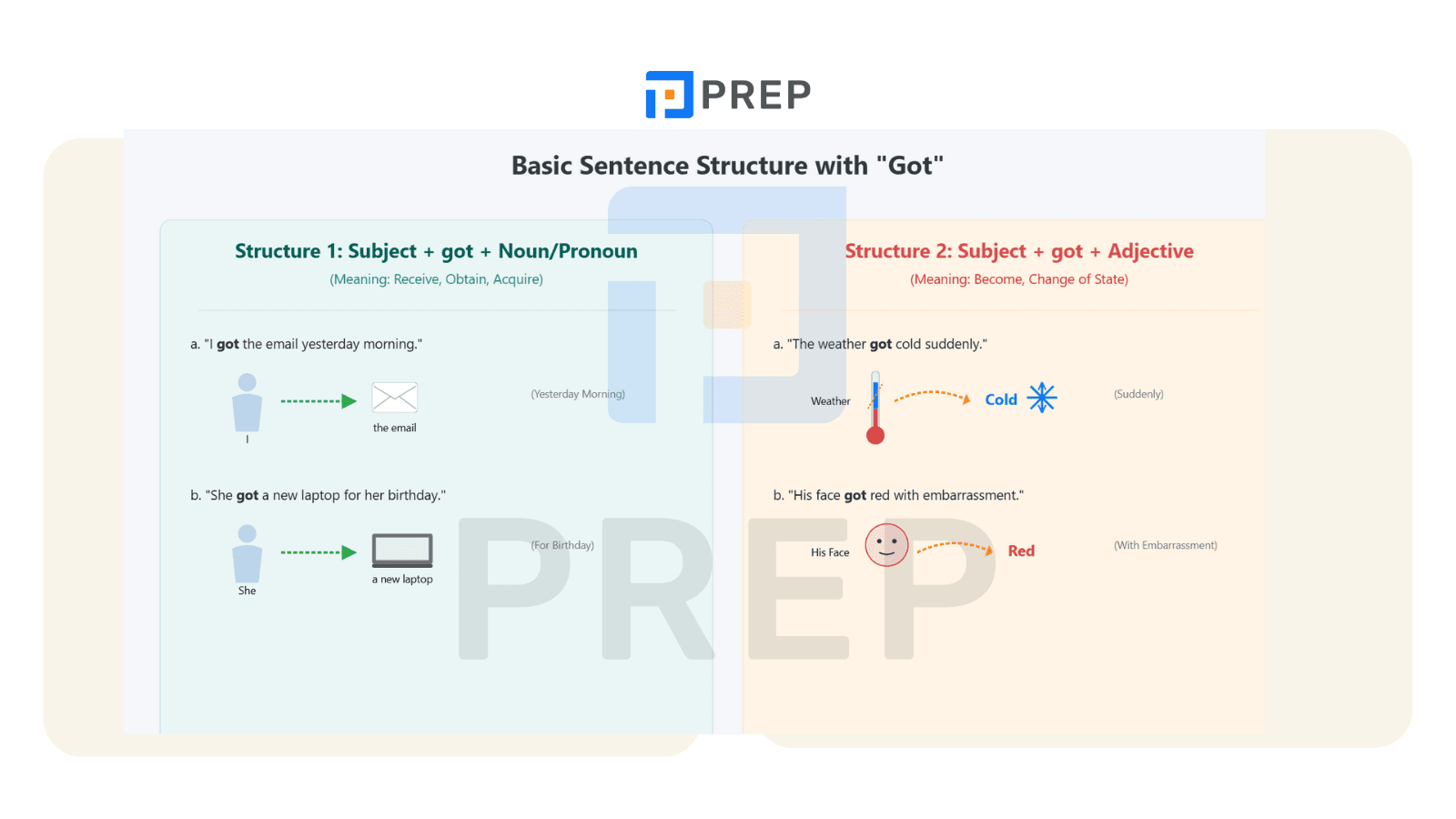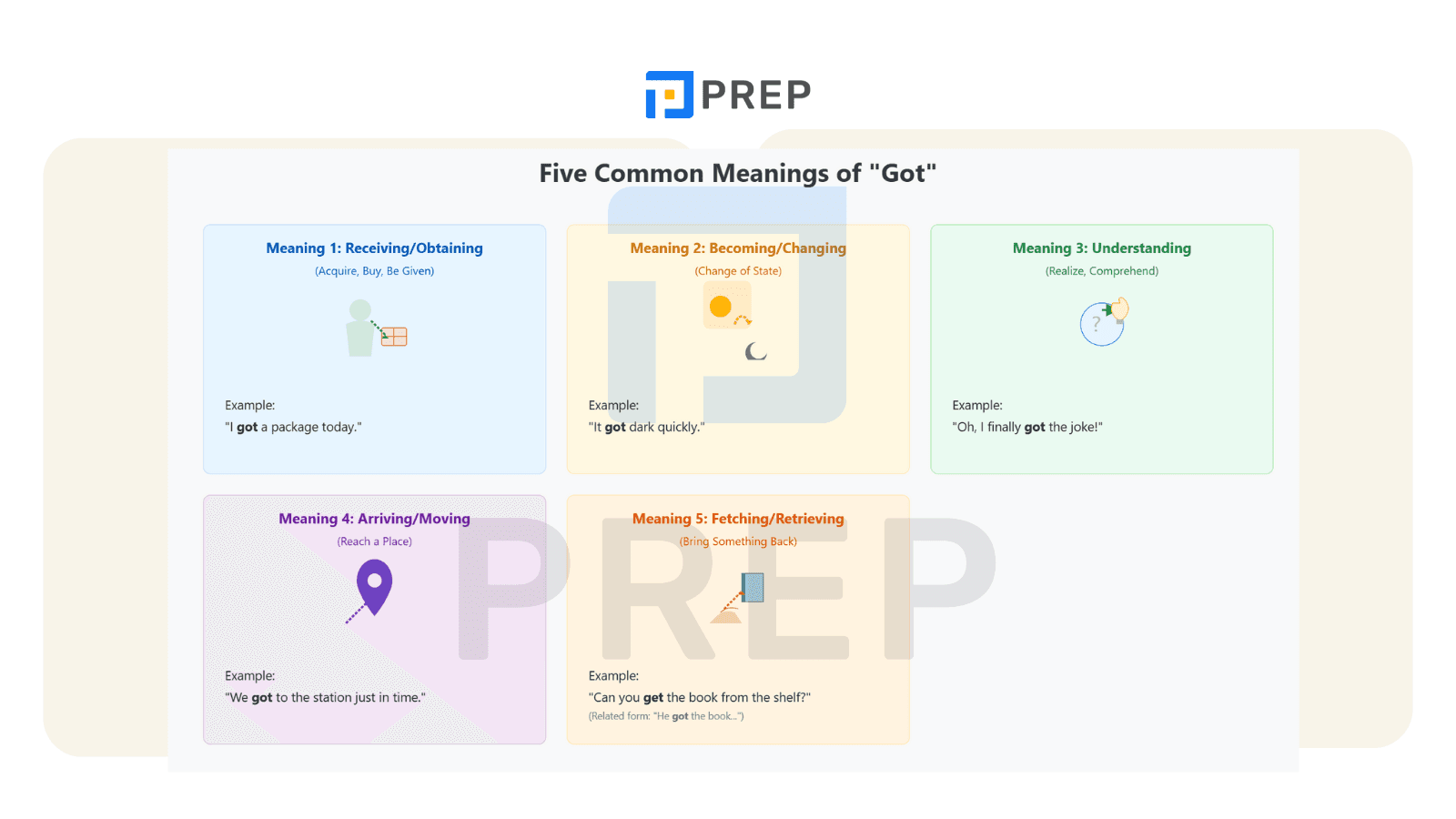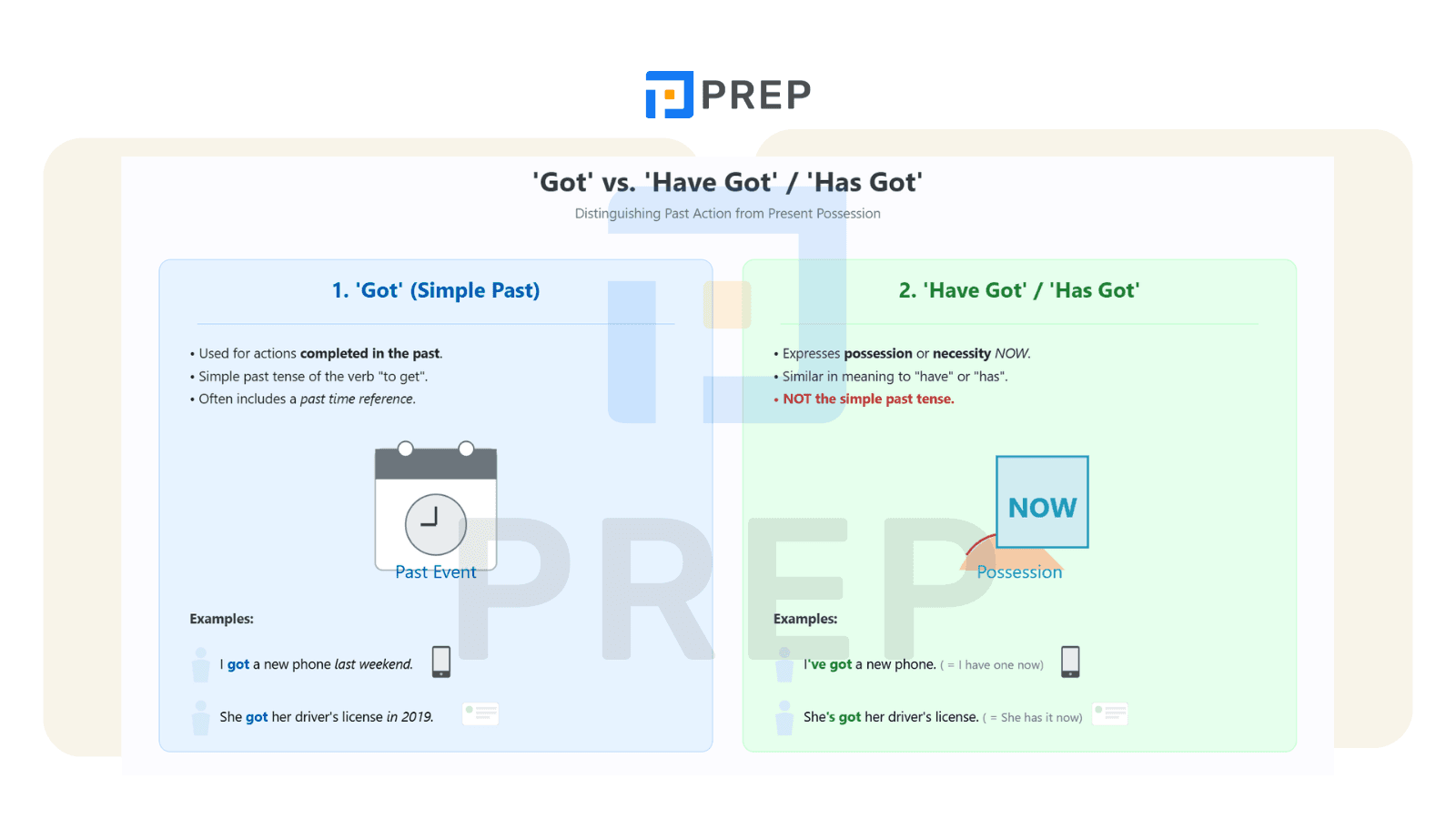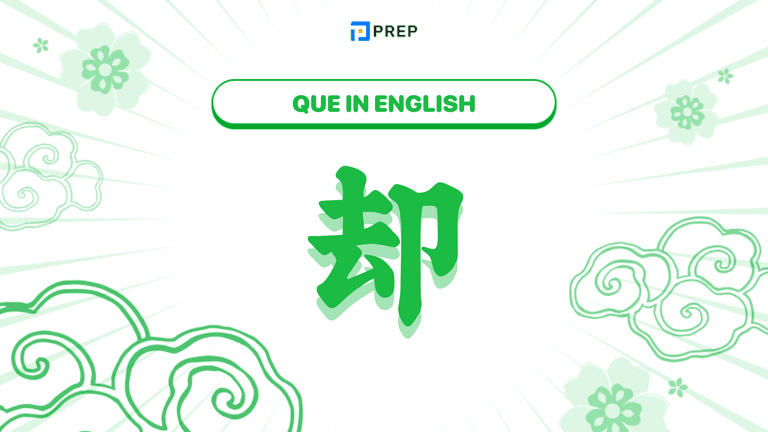Mastering the past tense of Get and all its usages for fluent English
This comprehensive guide examines the past tense of Get in English, covering its grammatical rules, semantic dimensions, and usage patterns. The content systematically explores the correct application of "got" in various contexts, contrasts dialectal differences between American and British English regarding "got" versus "gotten," and addresses common errors in forming questions and negatives. It distinguishes between the simple past "got" and the present perfect "have got," while also explaining the multiple meaning categories of the verb including acquisition, state changes, comprehension, movement, and retrieval. The guide concludes with practical information addressing frequently confused aspects and idiomatic expressions involving this versatile verb form.
- I. The Simple Past Tense of Get in English
- II. Understanding the core meanings of 'Got' in the past
- III. Avoiding the 'Got' vs. 'Gotten' Confusion
- IV. Using 'Got' correctly in questions and negatives
- V. Distinguishing 'Got' (Past Action) from 'Have Got' (Present State)
- VI. Frequently asked questions about 'Got'
- VII. Conclusion

I. The Simple Past Tense of Get in English
The simple past tense of get is got. This form indicates an action completed at a specific time in the past, with no connection to the present. English speakers use this form regularly to describe actions that began and ended in the past.
1. The principal parts of "Get"
-
Base Form: get (present simple)
-
Past Simple: got
-
Past Participle: got/gotten (varies between British and American English)
-
Present Participle: getting (used with continuous tenses)
2. Basic sentence structure:
a. Subject + got + Noun/Pronoun:
"I got the email yesterday morning."
"She got a new laptop for her birthday."
b. Subject + got + Adjective:
"The weather got cold suddenly."
"His face got red with embarrassment."

II. Understanding the core meanings of 'Got' in the past
When using "got" in the past tense, it maintains all the versatile meanings of "get," simply placing those actions or states in past time.
1. Meaning 1: Receiving, obtaining, or buying
This category covers instances where someone came into possession of something, whether through receiving, actively obtaining, or purchasing it.
-
She got the information from her supervisor last week.
-
I got tickets to the concert when they went on sale in April.
-
We got a new car at the dealership downtown.
2. Meaning 2: Becoming or experiencing a change
This usage indicates a change of state or condition, whether physical, emotional, or situational.
-
The children got excited when they heard about the field trip.
-
She got sick after eating at that restaurant.
-
The meeting got boring after the first hour.
Common collocations:
-
got ready
-
got dressed
-
got tired
-
got lost
-
got married
-
got angry
-
got better
-
got worse
3. Meaning 3: Understanding or realizing
This meaning relates to mental comprehension, grasping concepts, or reaching understanding.
-
I finally got the joke after thinking about it for a minute.
-
She never got the point of his argument during the debate.
-
Did you got his explanation about the new procedure?
4. Meaning 4: Arriving at or moving to
Here, "got" indicates movement or arrival at a destination.
-
We got to the airport just in time for our flight.
-
She got home at midnight after the concert.
-
What time did you get to the office yesterday?
5. Meaning 5: Fetching or retrieving
This usage involves going somewhere to bring something back.
-
I got the mail from the mailbox this morning.
-
He got some books from the library for his research project.

III. Avoiding the 'Got' vs. 'Gotten' Confusion
Understanding the distinction between "got" and "gotten" is essential for mastering English grammar, especially when navigating differences between American and British English.
1. The Simple Rule
Got is the Get past form in ALL major English variations. Whether you're speaking American English, British English, Australian English, or any other variant, "got" is always the correct form for Get in past simple.
2. Understanding 'Gotten'
Gotten functions primarily as the Get past participle form in American English (AmE). The past participle is the form used with auxiliary verbs like have, has (present perfect of Get), or had (past perfect of Get) to form perfect tenses.
In British English (BrE), "got" is typically used for both the Get past tense and past participle.
Compare these examples:
-
"I have gotten taller since last year." (AmE)
-
"I have got taller since last year." (BrE)
But remember, when talking about yesterday or any specific time in the past, both varieties use the simple past: "I got taller last year."
3. Quick comparison table
|
Tense |
Form (AmE) |
Form (BrE) |
|
Past Simple of Get |
got |
got |
|
Past Participle of Get |
gotten |
got |
IV. Using 'Got' correctly in questions and negatives
Many English learners stumble when forming questions and negatives with "got." Master these structures to avoid common errors.
1. The golden rule
⚠️ Always use the auxiliary did/didn't + the base form get (NOT 'got') when forming questions and negatives in the simple past tense.
2. How to form questions
The correct structure is: Did + Subject + get...?
-
Did you get my message yesterday?
-
Did she get a promotion last month?
-
Did they get home safely after the party?
❌ COMMON ERROR: "Did you got my message?" is incorrect.
3. How to form negatives
The correct structure is: Subject + didn't + get...
-
I didn't get the joke when he first told it.
-
She didn't get the promotion she was hoping for.
-
They didn't get tickets to the concert.
❌ COMMON ERRORS:
-
"I didn't got the joke" is incorrect.
-
"He not got the job" is incorrect.
V. Distinguishing 'Got' (Past Action) from 'Have Got' (Present State)
The distinction between "got" and "have got" confuses many English learners because they sound similar but function differently.
1. 'Got' (Simple Past)
"Got" on its own indicates a completed past action. It tells us something happened at a specific time in the past.
-
I got a new phone last weekend.
-
She got her driver's license in 2019.
2. 'Have Got' / 'Has Got'
"Have got" or "has got" expresses possession or necessity in the present moment, functioning similarly to "have" or "has."
-
I've got a new phone. (I have a new phone now)
-
She's got her driver's license. (She has her license now)
This construction is NOT the simple past tense of "get."
Confusing these forms leads to tense inconsistencies and unclear communication. When you want to speak about a past acquisition, use "got." When referring to current possession or state, use "have/has got" or simply "have/has."

VI. Frequently asked questions about 'Got'
1. What are the main phrasal verbs using 'got'?
"Get" forms numerous phrasal verbs that take on specific meanings when combined with prepositions or adverbs:
-
got up (arose from bed)
-
got away (escaped)
-
got over (recovered from illness/relationship)
-
got through (completed successfully; survived)
-
got on/off (entered/exited a vehicle)
-
got along with (had a good relationship with)
-
got back (returned)
2. Is it ever grammatically correct to say "getted"?
No. "Getted" is never grammatically correct in standard English. Since "get" is an irregular verb, it does not follow the regular -ed pattern for past tense. The correct past tense is always "got," and using "getted" would immediately mark speech or writing as non-standard.
3. How does 'got' in Singlish differ from Standard English 'got'?
In Singlish (Singaporean English), "got" often functions as a present tense verb where Standard English would use "have," "has," or "there is/are." For example, "Got question?" in Singlish means "Do you have a question?" in Standard English. Similarly, "The shop got many customers" means "The shop has many customers." This usage is specific to the local context and considered informal in international communication.
4. Besides 'get', what are other common irregular verbs?
English has numerous irregular verbs that don't follow the standard -ed pattern. Some frequently used examples include:
-
go/went
-
see/saw
-
eat/ate
-
take/took
-
make/made
-
come/came
-
bring/brought
Like "get," these verbs require memorization of their irregular forms rather than applying a pattern.
5. What does "You got me there" mean?
This common idiom is an admission that the speaker has been stumped or has no counter-argument. It means "I concede your point" or "I don't have an answer to that." It's a friendly way of acknowledging when someone has made an irrefutable point or asked a question you can't answer.
VII. Conclusion
Language mastery requires ongoing exposure, practice, and refinement. The journey from understanding the basic past tense of get to mastering all its nuances reflects the broader process of language acquisition. Each new context, idiom, or construction featuring "get" adds another layer to your communicative competence.
At PREP, we understand that true language mastery emerges from comprehensive understanding and contextualized practice. Our approach integrates grammatical knowledge with practical application, helping you move beyond memorizing forms to truly internalizing language patterns for authentic communication.

Hi I'm Chloe, and I am currently serving as an Product Content Administrator at Prep Education. With over five years of experience in independent online IELTS study and exam preparation, I am confident in my ability to support learners in achieving their highest possible scores.
Comment
Premium content
View allPersonalized roadmap
Most read












